Murina Was Seen by 50,000 Spectators in France, Going to US Cinemas
June 14, 2022 - Murina has been seen by more than 50,000 people in cinemas across France so far, and distribution of the film will start in July in the United States, confirming the quality and interest of this film, which won at prestigious Cannes Film Festival last year.
In the regular distribution period in French cinemas, which began on April 20, Antoneta Alamat Kusijanović's "Murina" has so far been seen by 50,133 viewers and has been shown in 94 cinemas, reports Dubrovački vjesnik. Murina will be in US cinemas from the beginning of July, and so far it has been arranged to be shown in cinemas in the United Kingdom, Ireland, Spain, Portugal, New Zealand, Australia, Mexico, Germany, Sweden, the Czech Republic, Slovakia, and many other countries.
The film Murina is the feature-length debut of director Antoneta Alamat Kusijanović and was executive produced by legendary filmmaker Martin Scorsese. The film premiered last year at the Cannes Film Festival where it was awarded the Golden Camera (Camera d'Or) which is awarded to the best debut film in all festival programs. This award is one of the greatest successes of Croatian film abroad, and Murina continues to be a success and attract audiences to cinemas.
To date, the film has been screened at more than 60 festivals and won 23 awards. In addition to the prestigious Cannes, there is also the award for best film in the Hamptons, as well as the Femme Du Cinema award in Les Arcs in France presented to Antoneta Alamat Kusijanović as the most promising director of the year. On June 19, at the ceremony in Zagreb, Antoneta Alamat Kusijanović will be presented with the annual "Vladimir Nazor" award given by the Ministry of Culture and Media for the best artistic achievements.
The film "Murina" is a story about the tense relationship between sixteen-year-old Julia and her authoritarian father Ante, which starts worsening when an old family friend arrives at their home on the island. While his father is preoccupied with trying to make a living with him, the charismatic guest opens more and more space for Julia and arouses her revolt against her parents. During a weekend filled with high expectations, Julia drags her family into a dangerous whirlwind of passion and violence.
The main roles are played by young actresses Gracija Filipović, Leon Lučev, Danica Ćurčić, and Cliff Curtis. The screenplay is by director Antoneta Alamat Kusijanović and co-written with Frank Graziano. The producers of the film are Danijel Pek (Antitalent) and Rodrigo Teixeira (RT Features), and the co-producers are Zdenka Gold (Spiritus Movens), Jožko Rutar (SPOK Films) and Miha Černec (Staragara).
Director Antoneta Alamat Kusijanović was born in Dubrovnik. She completed her studies at the Academy of Dramatic Arts in Zagreb and then directed at Columbia University in the USA. For her short film Into the Blue, she won awards in Berlin and the Heart of Sarajevo, and the film was nominated for a Student Oscar.
For more, check out our lifestyle section.
The New York Times Includes Murina in its Summer 2022 Movie Watchlist
May 31, 2022 - The New York Times put together a list of movies hitting theaters and streaming services in the United States this summer, including the Croatian film Murina, directed by Antoneta Alamat Kusijanović, which won the Caméra d'Or in last year's edition of the prestigious Cannes Film Festival.
Almost a year has passed since Murina, directed by Dubrovnik-born Antoneta Alamat Kusijanović, began its run of success at major international film festivals, beginning with the prestigious Cannes Film Festival, where it took home the Caméra d'Or. The award recognizes the Best First Feature Film.
Before Murina, Antoneta Alamat Kusijanović directed the short film Into the Blue, awarded at international film festivals in Berlin and Sarajevo, which also starred her muse, Croatian actress Gracija Filipović. In a spiritual sequel to Into the Blue, Murina tells the story of Julija (Filipović), a teenage girl who decides to replace her controlling father with his wealthy foreign friend during a weekend trip to the Adriatic Sea.
The main locations of the film include the idyllic island of Koločep, the starkly beautiful Kornati archipelago, and the pebble cove of Dubovica near Hvar.
The debut feature film by Alamat Kusijanović, who also wrote the screenplay, was produced by legendary filmmaker Martin Scorsese, who recently shared his feelings for the Croatian film:
''When RT Features brought me Antoneta Alamat Kusijanović's short film Into the Blue, I was quite impressed: here was a director with a picture she needed to make, who was clearly in it for the long haul. When I read the script for the feature that Antoneta developed from the short, I wanted to help get it into production. It was a long road: Antoneta was in the midst of editing when COVID arrived, it set her back for a whole year, but she got there.
I'm so impressed by Murina: by the raw immediacy of the conflict between father and daughter, which feels like it could only happen in such an elemental setting; by the psychosexual tensions between all the characters, so beautifully acted; and by the sheer physical force of the picture.
I'm excited for audiences to see Murina for themselves, and to witness the emergence of an extremely talented young filmmaker''.
Murina, in addition to taking the prestigious award at Cannes, was also recognized at the Hamptons International Film Festival, the Slovene Film Festival, and the Sofia International Film Festival, as well as being screened at numerous important film festivals around the world, such as the Toronto Film Festival. Unfortunately (and controversially), the film directed by Alamat Kusijanović was not selected by the respective committee to represent Croatia in the last edition of the Academy Awards.

Almost a year after its premiere in Cannes, the multi-award-winning Croatian film continues to tour the world, and this time it hits US theaters on July 8 this year, something that the renowned New York Times has highlighted by including it in their Summer 2022 watchlist.
The film's success also came through individual accolades. Murina's lead, the talented young actress Gracija Filipović, was honored at the 72nd Berlin International Film Festival with the Shooting Stars Award, given to the 10 best young actors on the continent. Likewise, director Antoneta Alamat Kusijanović has been officially announced as part of the jury of the 28th Sarajevo Film Festival, along with Austrian director Sebastian Meise, French director Lucile Hadžihalilović, Serbian actor Milan Marić, and Israeli producer Katriel Schory.
Congratulations to Antoneta, Gracija, and the entire Murina cast and crew for all the continued success!
For everything you need to know about filming in Croatia, in your language, be sure to check Total Croatia's page.
For more, check out our lifestyle section.
Rajko Grlić: How I Shot Some of the Most Famous Love Scenes of Croatian Film
May 21, 2022 - The renowned Croatian director Rajko Grlić writes in detail the secrets behind the camera of the remembered love scenes in his films ''You Love Only Once'' (1981) and ''The Border Post'' (2006).
Rajko Grlić writes for Telegram.hr
In the small inside pocket of a velvet jacket, I found a note that tries to answer the question I am most often asked: "How are love scenes filmed?"
"Love scenes", which is a euphemism for those sweet-simple things that are not talked about out loud in good families, are not recorded easily or quickly. Moreover, these recordings are not overly pleasant for the actors or the team, not to mention the director. Above them, especially at the beginning, there is always some tension, discomfort. And while they are there, it is difficult to record a scene that smells a bit of life.
''You Love Only Once'' (''Samo jednom se ljubi'') was a film that tried to say that the touch of the skin is stronger than all ideologies, so "love scenes", as evidence of this thesis, are represented in it in impressive numbers.
A recording call that changed everything
For a long time, a few months before the filming, I started talking to Vladislava Milosavljević and Predrag Manojlović about what we were going to do and how. She was insecure, reserved, and he was brave. I remember how amused he was by her timidity, how he annoyed her with stories that close-ups would be filmed afterward with professional porn actors.
To keep the discomfort to a minimum, we organized a recording of these scenes over the course of a week. Another mitigating circumstance was that we did them in the studio so that Pico Pinter could make a general light and still work with very small corrections. In short, we were both fast and isolated. In addition, we fulfilled Vladica's wish that only those who really had to be there, should be around the camera.
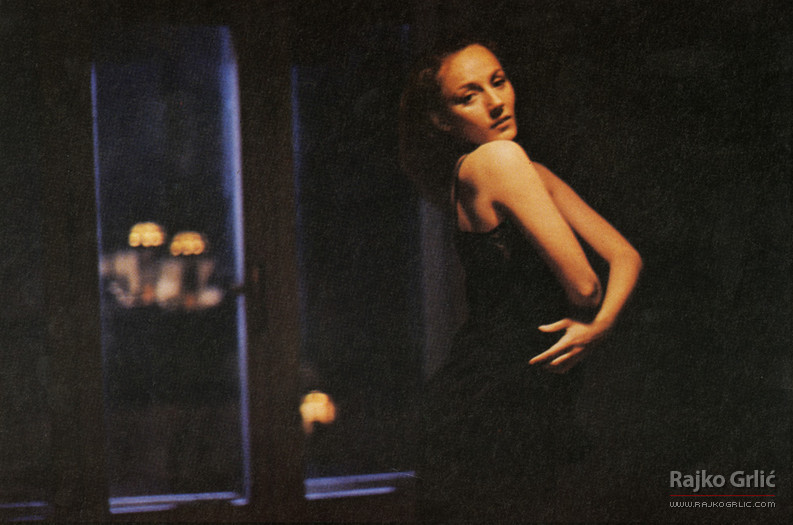
''You Love Only Once'' (Image: www.rajkogrlic.com)
The first day of filming did not bring us good material. The second day was a little, not much, better. On the third day, just when we started, the assistant producer came requesting for Vladica to answer the phone because her mother needed her urgently. Vladica jumped out of bed and ran to the door that leads from the studio to the hallway where there are wardrobes, make-up artists, and production. She returned after a few minutes saying there was nothing urgent.
Love scenes have to move the story forward
She didn't even notice that she left and came back completely naked. We watched her and started laughing. She understood why we were laughing, spread her arms, and shrugged with laughter. Shyness, fear, discomfort, and everything that hovered above us suddenly disappeared. The third day was more than successful.
In that filming, I learned that the first day of filming such scenes, sometimes even days, can be calmly, and in advance, considered lost. That the actresses in the rehearsals are full of fear and apprehension, while the actors in that phase are strikingly brave. On the set itself, things sometimes turn around. They are much braver here and once they relax they work great. Actors, unlike actresses, very often lose their courage at that very moment, become timider, have too many questions.
I learned something else, perhaps most important: that these scenes have their place in the composition of the film, that, as critics would say, they are justified only when they are ambiguous, when in them, besides touching the skin, we can read something more, something that enriches those faces, something that moves the story forward.
Detailed rehearsals of Verica and Tony at the hotel
We filmed ''The Border Post'' (''Karaula'') many years later in similar conditions. We filmed all the love scenes in the studio, an abandoned depot in Ohrid where we built her apartment. It was then that I realized that what I learned by doing ''You Love Only Once'' is not always the rule. That the material on the first day of filming love scenes can be thrown away peacefully was repeated here. But the fact that he is braver in the rehearsals and she is more frightened that it would be the other way around on the set, did not happen here.
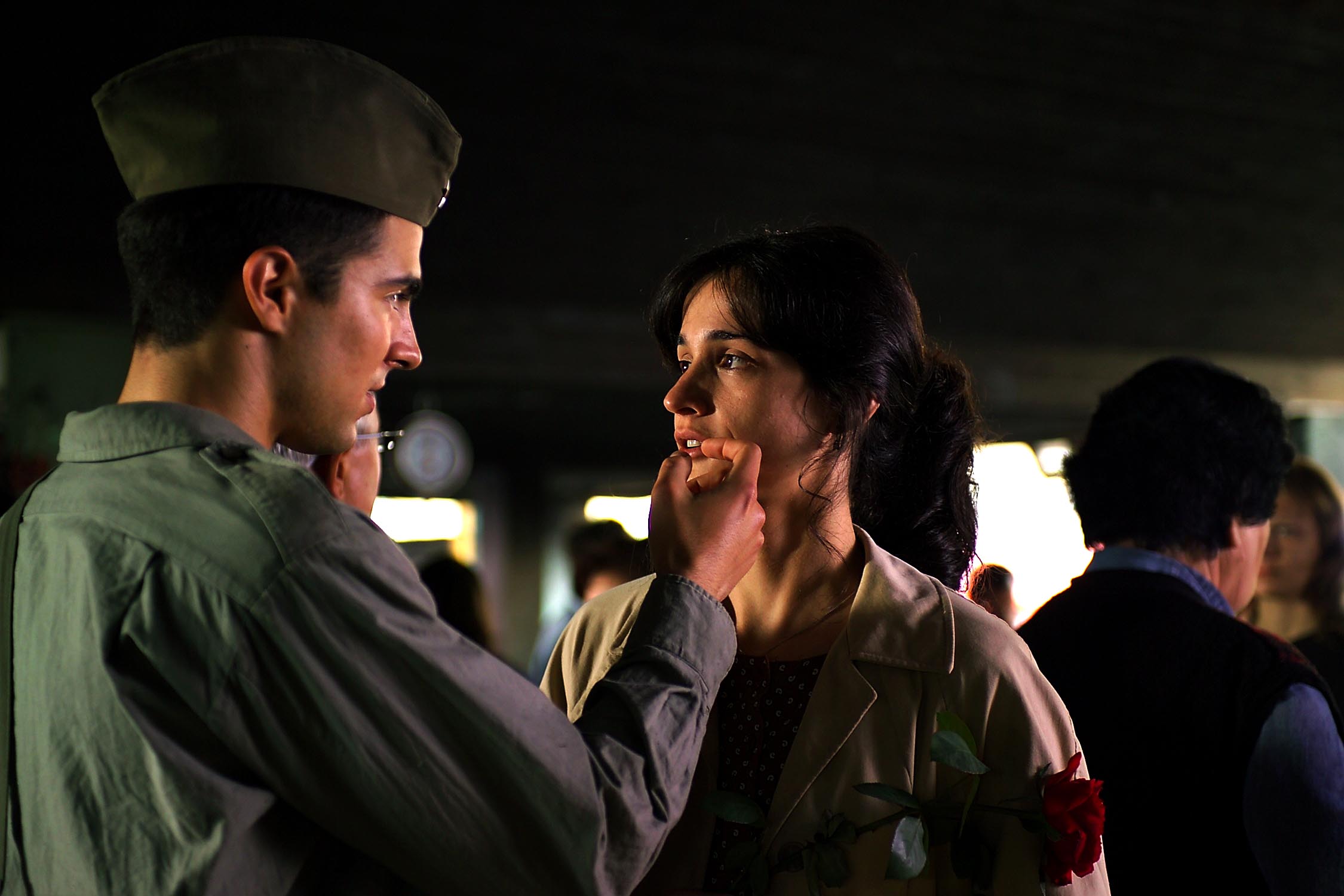
Toni Gojanović and Verica Nedeska in ''The Border Post''. (Image: www.karaulafilm.com)
Verica Nedeska was braver in the preparations and on the set than Toni Gojanović, for whom, unlike her, it was his first film and he had no experience, not only with such scenes, but with filming in general.
During the rehearsals, Verica felt a little uneasy with Tony, and one day she came up with a suggestion that we should take a room in the hotel where we are staying, that she and Tony should take off their clothes, go to bed and I would explain to them, scene by scene, what they will do, where the camera will be, what will be seen and what will not.
How his whole life leaked out of the scene
A make-up artist was standing next to me in the hotel room, knowing what awaited her, and I was slowly explaining to Verica and Toni what, where and how I intended to film it. We went through movement after movement, scene after scene, seeing what was possible, what wasn’t, and most importantly: how they feel about it. After that rehearsal, we were sure we knew exactly what we were going to do and how we were going to do it.
But despite that, the first day of filming did not bring us anything good. When we got back to the hotel, I spent hours looking at that material and thinking about where the mistake was. And it lay in the fact that we all knew everything, that the scene became mechanical and that life flowed out of it and with it the most important thing: eros.
For the next day, I prepared small and slightly bigger surprises, talked to her alone and separately, gave them small tasks that the other person didn't know about, and the shooting went surprisingly smoothly.
'Bata' Živojinović in tiger shorts
It’s a whole other story when those scenes are done in a comedy. It is then a difficult, perhaps the most difficult "love-stage" discipline. So, in ''In the Jaws of Life'', I had with me the experienced 'Bata' Živojinović, a hero of partisan films who walks around in tiger shorts and for whom this was perhaps the first love scene in more than three hundred films he made, while opposite him was Vitomira Lončar, on her first film, covered only with a transparent veil of a wedding dress.
But that is a long story from another pocket that I wouldn't take out now. What my father, who apropos of "love scenes" used to complain about me calling him to premieres, not rehearsals, used to say: "Play, play, and hit the belt."
For more, check out our lifestyle section.
Latest Film by Director Stanka Gjurić Selected at CIFF in Dhaka, Bangladesh
May 19, 2022 - The latest film by writer and filmmaker Stanka Gjurić, "Son of a Prophetess", is now part of the official selection of the prestigious Cinemaking International Film Festival in Dhaka, Bangladesh.
The latest film by writer and filmmaker Stanka Gjurić, "Son of a Prophetess", with award-winning classical guitarist Srđan Bulat and poetess Ivanka Blažević Kiš in the lead roles, has entered the official selection of the prestigious Cinemaking International Film Festival in Dhaka, Bangladesh, which will take place in November 2022.
The short thriller-drama film was shot in Croatia and follows a young man who arrives from a trip, expecting his mother who is a prophet by occupation, to bring him the dog that she was taking care of during that time.
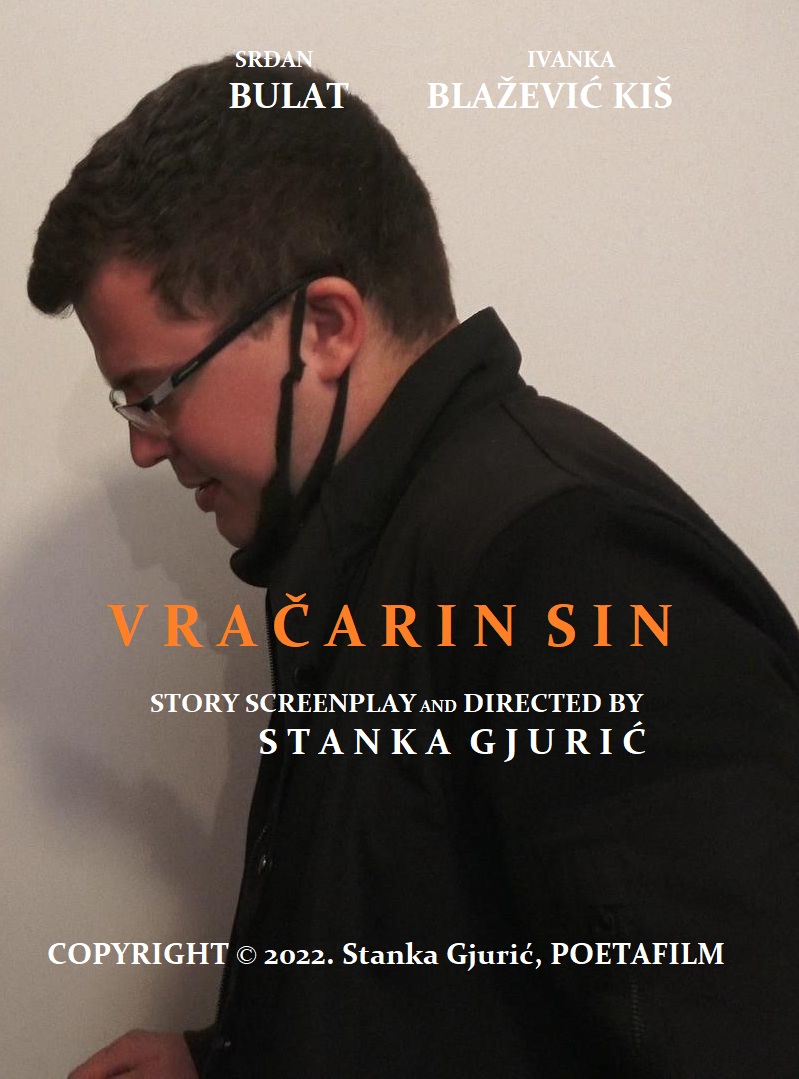
Stanka Gjurić is a poet, essayist, actress, columnist, and filmmaker from Croatia. She was born in Čakovec, but today she lives in Zagreb. She has published 20 books and received numerous literary awards for her poetry. Stanka is a member of Croatian Independent Artists and the Croatian Academy of Science and Art in Diaspora (Basel, Switzerland). With her first short film 'Ubojite misli' (Battle Thoughts) she gained international recognition.
‘CIFF’ is one of the most important international film festivals in South Asia based in Bangladesh. It is organized with the support of DHAKA Festival and the largest film distribution and co-production company in South Asia, Cinemaking24.com. ‘Cinemaking’ is an international distribution and co-production company that seeks to promote film globally.
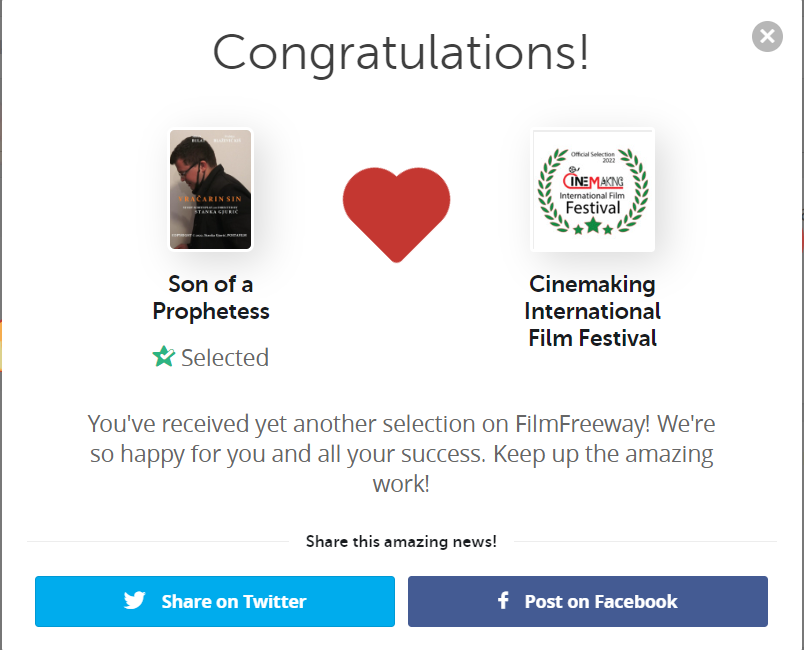
The last edition of the Cinemaking International Film Festival 2021 was a competition of 600 films from 121 countries, selected in a competition of thousands of films submitted to the competition. The festival was held in several places, such as the International Mother Language Institute, then in the main national cultural center, the famous ‘Bangladesh Shilpakala Academy’, and in the equally famous ‘Shahojpath’ school in Dhaka.
Croatian filmmaker Stanka Gjurić has presented her films all around the world: France, Italy, Greece, Portugal, Spain, Bosnia and Herzegovina, Switzerland, Slovenia, Egypt, Canada, Serbia, USA, South Africa, Argentina, India, Russia, Austria, Brazil, Great Britain, etc. With her short films, to date, Gjurić has won 15 international awards.
For everything you need to know about filming in Croatia, in your language, be sure to check Total Croatia's page.
For more, check out our lifestyle section.
Series "The Silence" by Dalibor Matanić Part of Berlinale Series Market Selects
ZAGREB, 23 Jan 2022 - Dalibor Matanić's new TV series "The Silence" (Šutnja), based on a trilogy by investigative journalist Drago Hedl, has been listed among 14 television series of the Berlinale Series Market Selects at this year's Berlin International Film Festival.
The Berlinale Series Market Selects is part of the European Film Market. It is dedicated to TV series and offers industry experts, right holders, buyers, and creatives a platform for discussing current developments in the world of series.
The programme will take place online, in parallel with the European Film Market, also taking place online, from 10 to 17 February. The event will include talk shows, showcases by international production companies, streaming platform and series events, online screenings, and a curated selection of high-quality series on the market, the Croatian Audiovisual Centre (HAVC) said.
Among the 14 selected projects, there are also series from Brazil, South Africa, and Israel.
The producer and one of the creators of the series, Nebojša Taraba, said that entering that market was a huge personal success, but they were even happier that this confirmed the international success of Croatian drama series such as "The Paper" (Novine), "Success" (Uspjeh), "The Last Socialist Artefact" (Područje bez signala), were no longer an exception but becoming a rule.
"Croatian television productions are not only the most successful in the Adria region but beyond, I dare say in Central and Southeast Europe," he said.
The eighth edition of the Berlinale Series Market (BSM) will take place from 14 to 16 February with an exceptionally international and diverse selection of series, according to European Film Market according to director Dennis Ruh.
"The Silence" is a six-part TV series based on Hedl's trilogy, which is described as a combination of police procedural novels and political thrillers.
The series will start broadcasting on Croatian Radio Television (HRT) on 7 March. It is produced by Drugi Plan and HRT and co-produced by Beta Film, Star Media, and OLL.TV, ZDF/ARTE. Series creators are Nebojša Taraba and Miodrag Sila (Drugi Plan), with the screenplay written by Marjan Alčevski. The series also stars Kseniya Mishina, Goran Bogdan and Darko Milas.
Congratulations Dalibor, and all the team behind the production of "The Silence"!
For everything you need to know about filming in Croatia, in your language, be sure to check Total Croatia's page.
For more made in Croatia news, follow TCN's dedicated page.
Legendary filmmaker, Croatian American Peter Bogdanovich dies aged 82
January 6, 2022 – Oscar-nominated film director and writer, the legendary Croatian American Peter Bogdanovich, has died aged 82. Conceived in Zagreb, he grew up in New York where he had an illustrious five-decade career that included hit movies like The Last Picture Show, Paper Moon and She's Funny That Way.
 Croatian American Peter Bogdanovich at the Castro Theatre in San Francisco in 2008, by Eliaws
Croatian American Peter Bogdanovich at the Castro Theatre in San Francisco in 2008, by Eliaws
Although he was conceived in Zagreb, it was perhaps natural that Croatian American Peter Bogdanovich should Americanise his name. His parents left the Croatian capital before their son was even born. Peter would grow up in New York, where he absorbed the culture and climate of the world-famous metropolis. In particular, he fell in love with its cinema.
As a young man, Bogdanovich was obsessed with movies. Early on, he scored a job as a film critic which allowed him to immerse himself in the world of movies. Within this era, he struck up a lifelong friendship with Orson Welles. Bogdanovich famously regarded Welles' Citizen Kane as the peak of cinema. Also at this time, Bogdanovich was given his first break as a film director by famous producer Roger Corman.
 Orson Welles (left) and Peter Bogdanovich (right)
Orson Welles (left) and Peter Bogdanovich (right)
The 1960s saw a revolution in the world of American cinema. Tired old formats such as historical epics and musicals were being swept aside. In their place arrived films by a fresh crop of restless, modern directors. For the most part, they were influenced by the much more radical and real European new wave cinema. Their films appealed to young audiences with gritty realism, unflinching violence and extreme flights of fancy.
Among these new American filmmakers you can find the now-classic names of Martin Scorcese, Woody Allen, Robert Altman, John Boorman, David Lynch, Terrence Malick, Francis Ford Coppola, Sam Peckinpah, Ridley Scott, Steven Spielberg, James Cameron, John Carpenter, Brian De Palma and Stanley Kubrick. Croatian American Peter Bogdanovich was definitely among them.
He started his career as a director by making a documentary about John Ford, the pre-eminent director of western movies. It is to Croatian American Peter Bogdanovich's enduring credit that this documentary remains one of the greatest examinations of Ford and his work.
Classics of legendary filmmaker, Croatian American Peter Bogdanovich
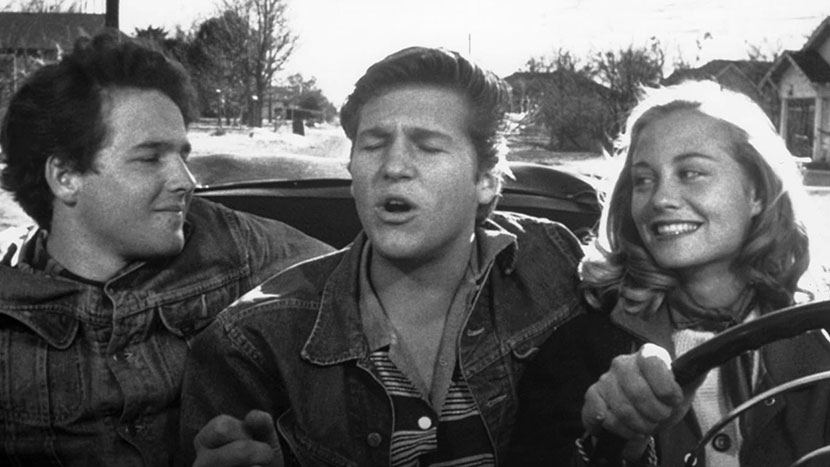 The Last Picture Show, with Jeff Bridges and Cybill Shepherd
The Last Picture Show, with Jeff Bridges and Cybill Shepherd
From there, Bogdanovich jumped to making his first proper film, 'The Last Picture Show'. Featuring Jeff Bridges, Cybill Shepherd and Cloris Leachmant, it was released in 1971. Universally acclaimed, the coming-of-age drama is as classic as Americana comes. It features a fine Hank Williams soundtrack and was the first lead-starring role of future great Bridges. This one film alone ensured Bogdanovich's name would forever be associated with cinema's exciting, new American movement.
Barbra Streisand and Ryan O'Neal starred in Bogdanovich's second film, the romantic comedy 'What's Up, Doc?' He reunited with Ryan O'Neal in 1973 for the film 'Paper Moon'. O'Neal’s daughter, Tatum, won an Oscar for best supporting actress with this film. After several immediate hits, Bogdanovich felt he could afford to be choosey about his next projects. He turned down The Godfather, The Exorcist and Chinatown.
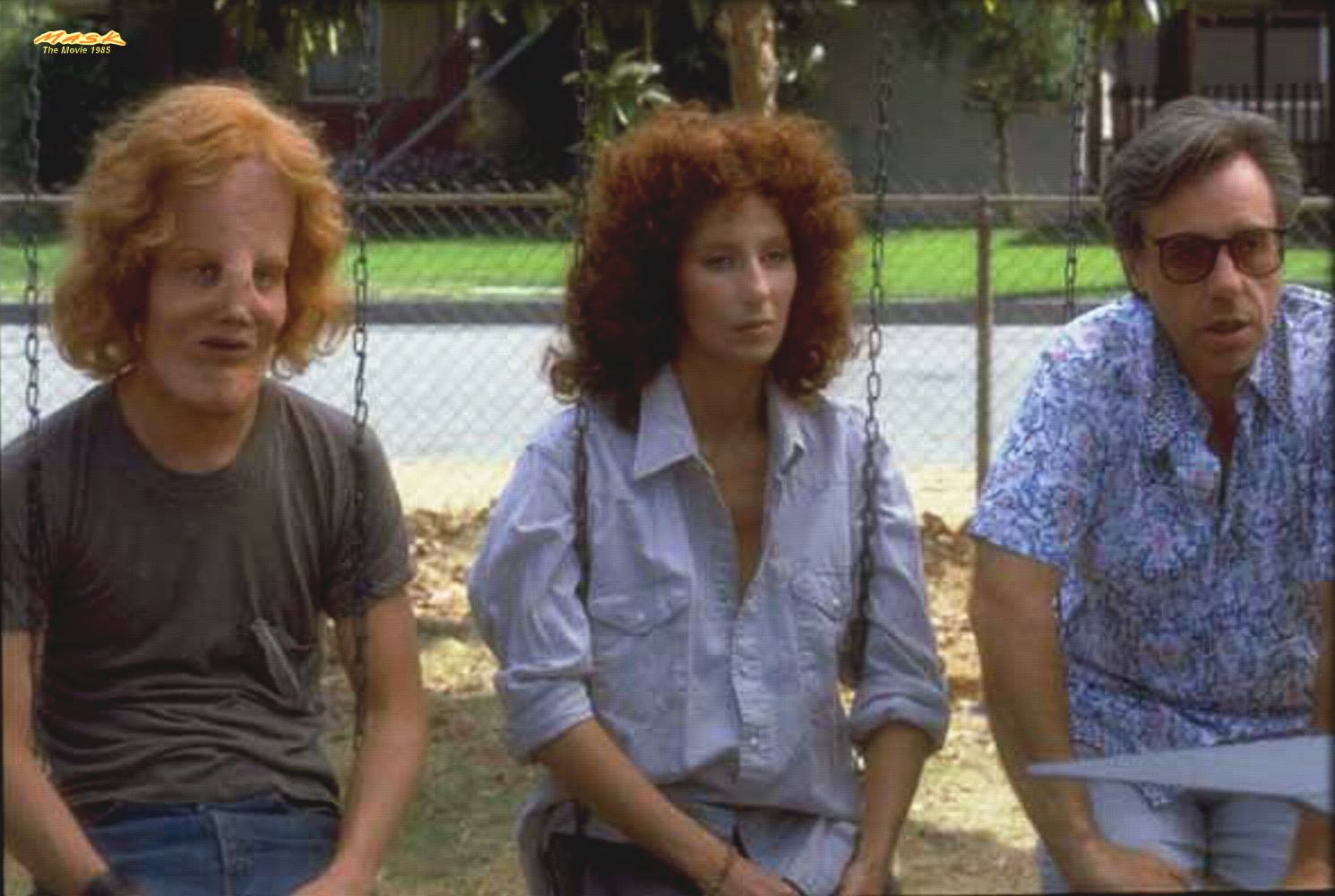 Set shot from classic 1985 emotional drama Mask, with Cher (centre) and Bogdanovich (right)
Set shot from classic 1985 emotional drama Mask, with Cher (centre) and Bogdanovich (right)
His later films included the classic emotional drama 'Mask', starring Cher, and 'The Cat’s Meow', starring Kirsten Dunst. A legend among the next generation of filmmakers, Bogdanovich appeared as an actor in cameo roles for cult director Quentin Tarantino and in The Sopranos series.
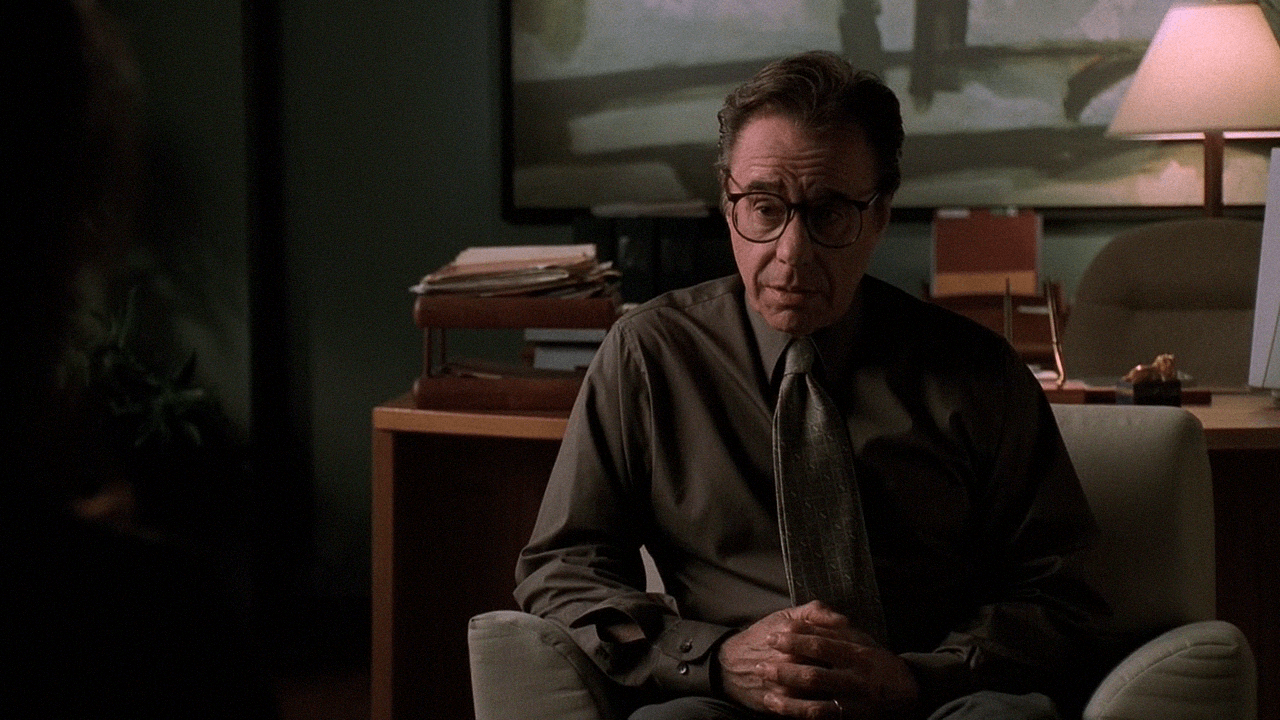 Croatian American Peter Bogdanovich plays Dr. Elliot Kupferberg in Episode 4, Season 3 of The Sopranos
Croatian American Peter Bogdanovich plays Dr. Elliot Kupferberg in Episode 4, Season 3 of The Sopranos
In 2010, he joined the faculty of the University of North Carolina School of the Arts and in 2014 made his last feature film, the comedy 'She’s Funny That Way' starring Jennifer Aniston and Owen Wilson. In 2018, he released his final film, a documentary about Buster Keaton - 'The Great Buster: A Celebration'.
Peter Bogdanovich is survived by his two children Antonia and Alexandra (Sashy), his sister Anna Bogdanovich and three grandchildren.
To read more about Croatian filmmaking and movies, look here
First Korean-Croatian Film Selected for Two Film Festivals
December 1, 2021 - With Seck Zeen Hong in the leading role, "Crisis" is the first Korean-Croatian film and first Croatian film starring an Asian actor in the main role. Shot in Zagreb during the pandemic, the coming of age drama about a young Korean man seeking to adapt to a new society has already been selected at two film festivals.
In a year where Croatian cinema has not gone unnoticed at international festivals, a short fiction film arrives to join the celebrations and mark a couple of historical milestones along the way. Crisis (Kriza in Croatian, 위기 in Korean), was created and produced by Benjamin Noah Maričak, directed by Boris Vuković, and written by Karla Leko; as part of their graduate work at the University of Zagreb - Academy of Dramatic Art, and it is the first Croatian-Korean film and the first Croatian film starring an Asian actor in the main role. The film was shot in the city of Zagreb during the current pandemic, and it was completed on June 23 of this year.
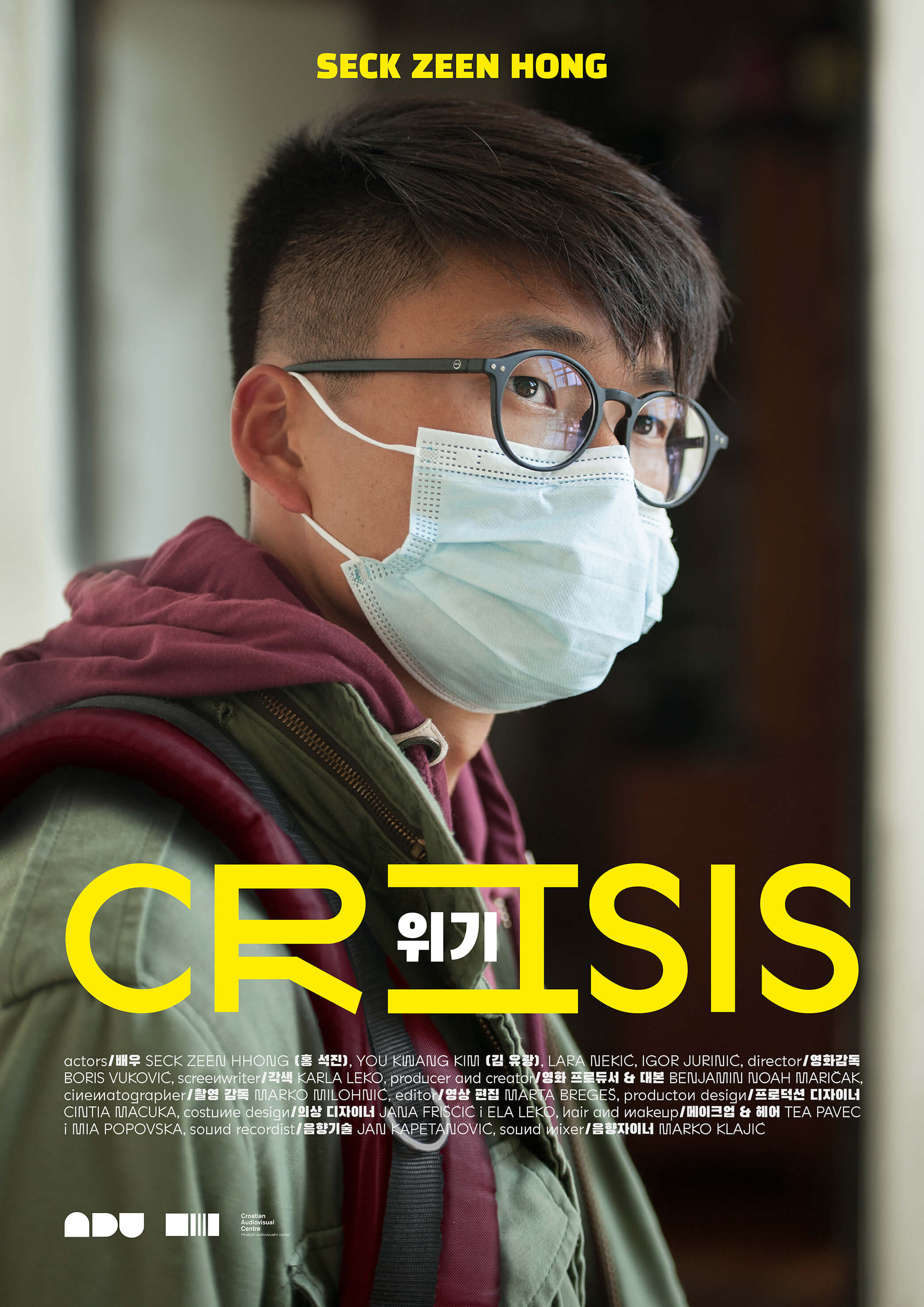
Official English Poster for Crisis
With a runtime of 14 minutes and 58 seconds, and featuring both Croatian and Korean languages, Crisis follows the day in the life of 20 something-year-old Ji-Hu (Zeen Hong) who is working for his father's Korean restaurant in the heart of Zagreb, as the delivery boy, during the beginning stages of the worldwide lockdown caused by the COVID-19 global pandemic. Throughout his delivery runs across Zagreb, he will not only have to deal with the constant pressure from his father and an odd variety of customers but also trying to adjust in a world where he still hasn’t found his place yet.
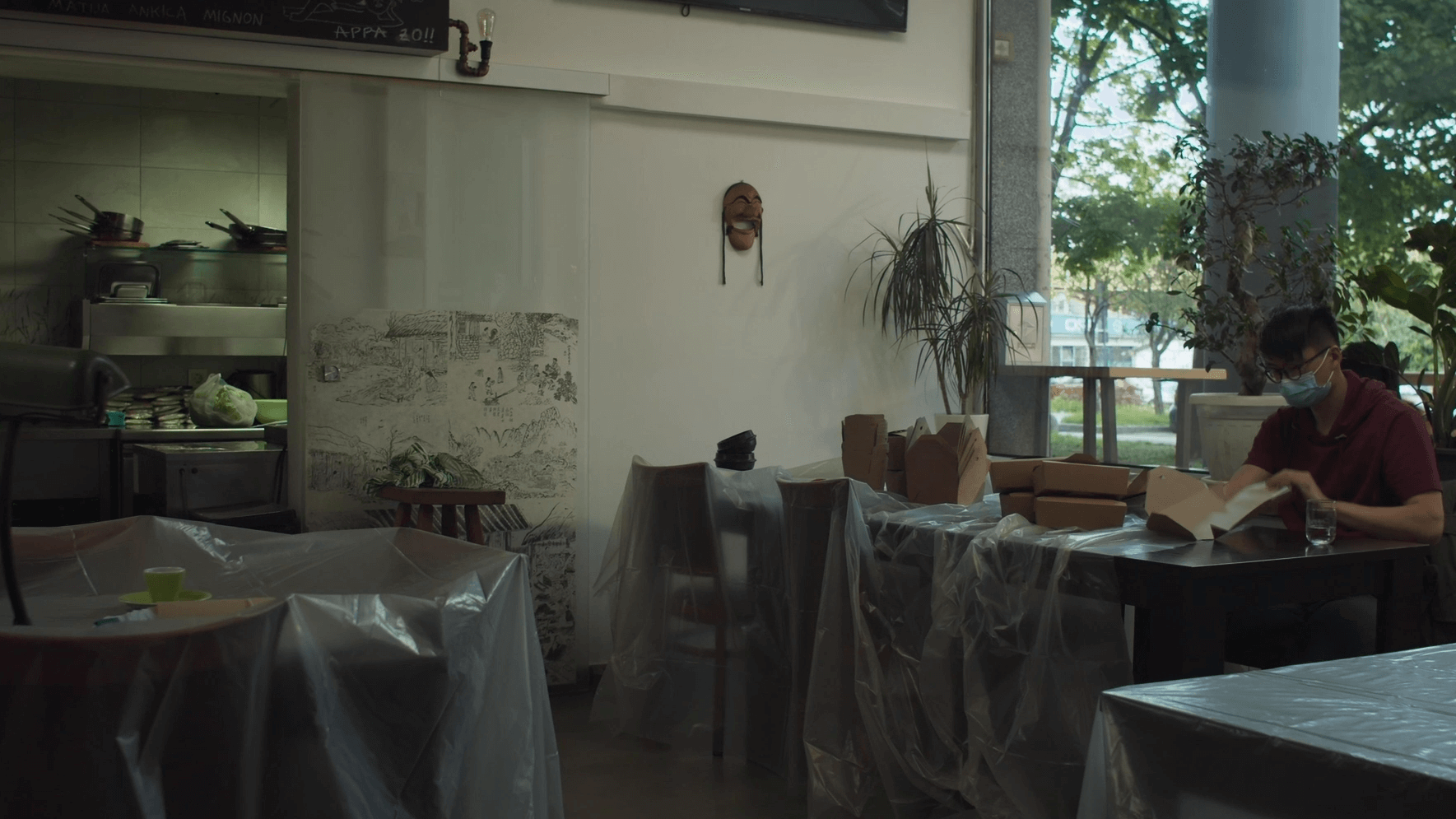
Seck Zeen Hong stars as Ji-Hu, a young Korean in his twenties, trying to adjust in the Croatian capital of Zagreb and dealing with pressure from his father, played by You Kwang Kim. Seck Zeen Hong becomes the first Asian actor to play a leading role in a Croatian film.
Everything seems to indicate that the coming of age family drama filmed in the Croatian capital has been well received, since to date the short film has been selected in the official program of two film festivals, confirms the producer and creator of Crisis, Benjamin Noah Maričak. The Asian premiere of the first Korean-Croatian film will be at the Dhaka International Film Festival (DIFF), the largest film festival in Bangladesh. The short film, which features photography by Marko Milohnić and editing by Marta Bregeš, will be part of the festival's official program in the Short & Independent Film Section. The DIFF will be held from January 15th to 22nd, 2022.
In addition, for the local public, Crisis was also accepted in the official program of the CIiklop Film Festival, which will take place in Benkovac, near the city of Zadar. The dates of the Ciklop Film Festival will be from December 18th to 22nd of this year. The official program with the full list of selected films will be published very soon.
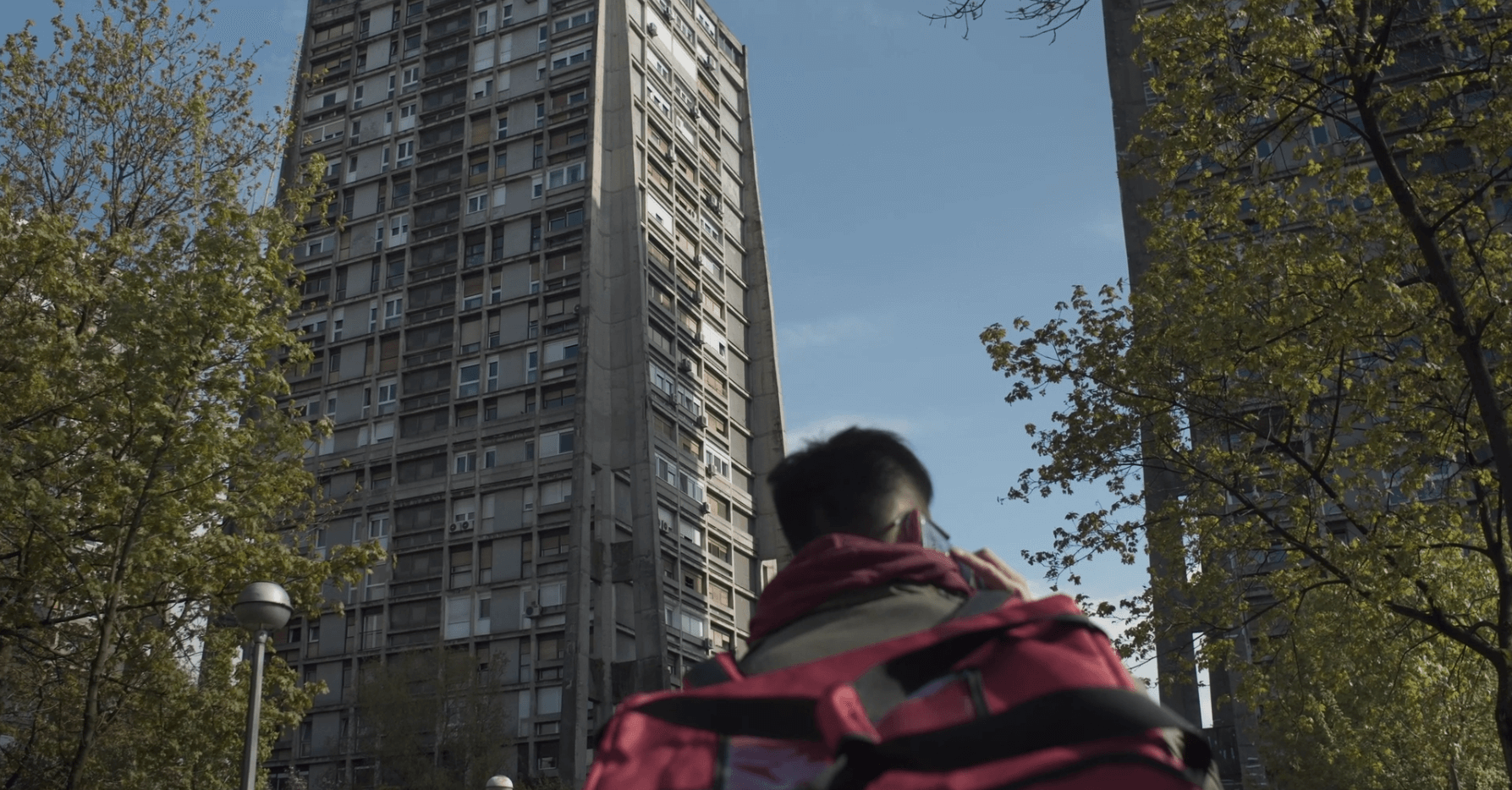
Crisis is the first Korean-Croatian film, and it was shot entirely in Zagreb. In this still from the film, you can see the famous brutalist residential buildings known as Rakete, built in 1968.
Here are the names of the cast and team behind the making of the first Korean-Croatian film, Crisis:
Cast
- Ji-Hu: Seck Zeen Hong (홍 석진)
- Father: You Kwang Kim (김 유광)
- Party Girl: Lara Nekić
- Slaven: Igor Jurinić
- Girls at Party: Lucia Luque Akrap, Laura Anić-Kaliger, Laura Bošnjak, and Dora Dimić Rakar
- Man in Tracksuit: Fabijan Pavao Medvešek
- Woman in Apartment: Alemka Sappe
- Teenager 1: Tara Dorotić
- Teenager 2: Klara Fiolić
- Man in Tram: Željimir Sappe
- Postman: Anđelko Katanec
- Bike Thief: Noa Nikolić
Crew
- Director: Boris Vuković
- Screenwriter: Karla Leko
- Producer and Creator: Benjamin Noah Maričak
- Cinematographer: Marko Milohnić
- Editor: Marta Bregeš
- Production Designer: Cinita Macuka
- Costume Designers: Jana Friščić and Ela Leko
- 1st AD: Filip Dizdar
- Hair and Make-up: Tea Pavec and Mia Popovska
- 1st AC: Urh Pirc
- 2nd AC / Best Boy: Tin Ostrošić, and Rene Recek
- Gaffer: Domen Martinčič
- Sound Recordist: Jan Kapetanović
- Boom Operators: Juraj Franolić, and Stjepan Hren
- Script Supervisors: Rudolf Ravbar, and Noa Nikolić
- Sound Mixer: Marko Klajić
- Color Grading: Marko Milohnić
- VFX: Marino Vuletić
- Assistant Editor: Stjepan Hren
- Title Designer: Tamara Milošević
- Production Assistants: Noa Nikolić, and Vedran Bošnjak
Thus begins the festival circuit for a project carried out by young filmmakers and artists, which explores existentialist and very human themes in a very complicated period of our history. We wish them the best and much success!
For everything you need to know about filming in Croatia, in your language, be sure to check Total Croatia's page.
To read more about lifestyle in Croatia, follow TCN's dedicated page.
30th Octavian Awards Now Open for Submission of 2021 Croatian Films
November 11, 2021 - The Octavian Award is the only Croatian film award that continuously follows the entire domestic cinematography, which makes it the most relevant and representative Croatian film award. Films competing for the 30th Octavian Awards are all premiered in Croatia during 2021 in Croatia, from January 1 to December 31.
As reported by tportal.hr, the Croatian Society of Film Critics is organizing the 30th Octavian Awards. Since 2019, HDFK has decided to award prizes independently in order to ensure greater media visibility for the awarded films and also for the activities of the film society as such. The Octavian Award is the only Croatian film award that continuously follows the entire domestic cinematography, which makes it the most relevant and representative Croatian film award. The list of previously awarded films and authors can be found on the official website of HDFK.
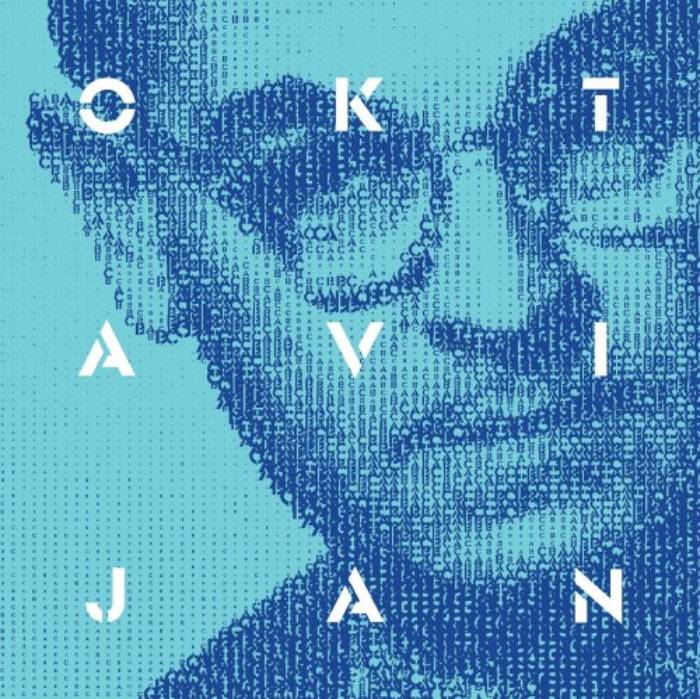
Photo: Ravno do DNA
All filmmakers and production companies are invited to submit their films for the 30th Octavian Awards via this APPLICATION FORM.
All submitted films will be watched and evaluated by a ten-member selection group of HDFK, and then the ten best films in each category will be evaluated by the remaining, pre-registered, members of the Society. Films in all categories are rated with a score of 1 (one) to 5 (five) via a ballot with a list of all competing films, and then the average score is calculated. The film with the highest average rating is the winner of Octavian, but this rating must not be lower than 3.50. In order for Octavian to be awarded in each individual category, at least ten (10) critics must vote. Ratings are published on the official websites of the Company www.hdfk.hr and zonafilma.com.
The ratings will be made public during the awards ceremony for the authors of the best films in early 2022.
Films competing for the annual Octavian Award are all Croatian premiered and publicly shown during 2021 in Croatia, from 1 January to 31 December.
The annual Octavian Award is given in these categories:
- Octavian for a feature film
- Octavian for a feature-length documentary
- Octavian for (short and medium-length) feature film
- Octavian for (short and medium-length) documentary
- Octavian for (short, medium, and feature) animated film
- Octavian for (short, medium, and feature) experimental film
- Octavian for (short, medium, and feature) feature film
- Octavian for best minority co-production
The Octavian Prize film application process will run until November 30, 2021.
The Octavian Prize Regulations can be found HERE.
For everything you need to know about filming in Croatia, in your language, be sure to check Total Croatia's page.
For more on lifestyle in Croatia, follow TCN's dedicated page.
Vukovar Film Festival Includes 40 Excellent Films in This Year's Edition
August 24, 2021 - The Vukovar Film Festival will start tomorrow in its fifteenth edition and highlights a program full of must-see films and documentaries.
As reported by Večernji list, this year's 15th Vukovar Film Festival from August 25th to 29th brings a total of 41 film screenings with five documentaries, which will be shown at several locations in the city.
The artistic director of the festival, Dean Sinovčić, said at the press conference that the Vukovar festival is best known for its program, according to which no festival in Croatia "can compete" with it.
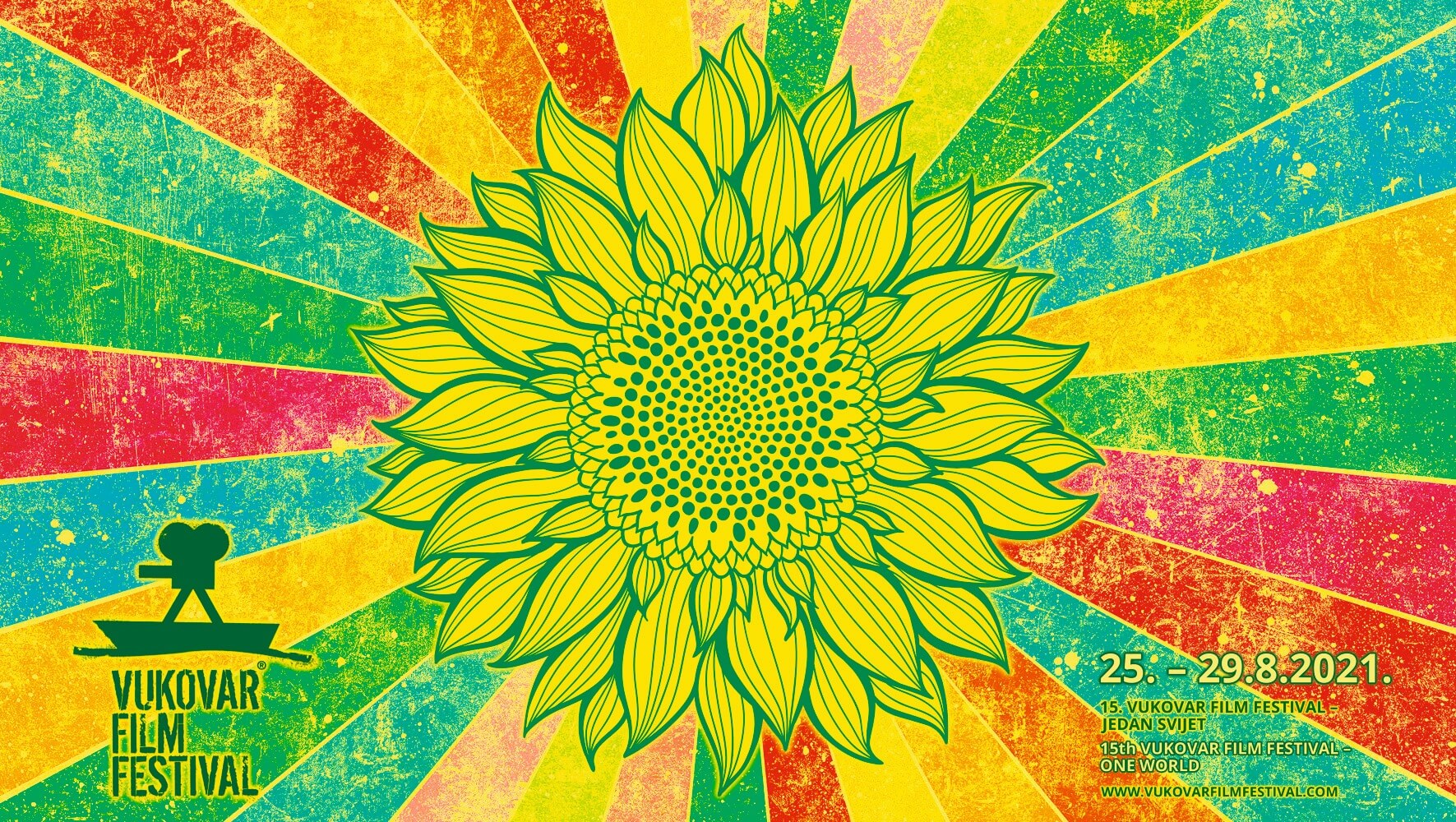
Vukovar Film Festival Official Facebook Page
He stated that a dozen films from the festival program are classic comedies to get people back in a good mood and that five films from the recently concluded Cannes Film Festival and several films from the Berlin and Venice festivals will be screened.
''Thus, we keep the quality that the Vukovar festival has offered in all previous years'', Sinovčić pointed out.
Festival director and executive director of Discovery film Igor Rakonić said that the festival opens with the film "Blue Flower", directed by Zrinko Ogresta, as the winner of this year's Pula Film Festival. He added that due to the announced cooling in the coming days, the screenings of films scheduled for screening on the terrace of the Agency for Waterways and the park of Eltz Castle will be moved to Hrvatski dom and Cinestar.
''The idea of this year's festival is to stay strong in film, we hope that next year the pandemic will pass and that we will start living normally'', he added.
Regarding the implementation of epidemiological measures, Rakonić said that epidemiological measures would be respected at the festival, with a reduced number of spectators, but that vaccinated persons would certainly not be separated from unvaccinated ones.
Vukovar Mayor Ivan Penava expressed satisfaction that the festival has maintained continuity, as well as because this year's, unlike last year's, which was held in a closing atmosphere, is now returning to a more normal atmosphere.
Considering that this year's festival is being held in the conditions of a pandemic, the organizers point out that this year there will be no usual awards ceremony, as well as accompanying entertainment and music activities.
They note that this does not apply to the traditional festival workshops that will be held, namely the Danube screenwriting workshop, the one-minute film workshop in one frame and the film workshop "From idea to realization".
The organizers of the Vukovar Film Festival are the company Discovery film, the City of Vukovar, and the Hrvatski Dom Vukovar.
For everything you need to know about filming in Croatia, in your language, be sure to check Total Croatia's page.
For more on lifestyle, follow TCN's dedicated page.
The 19th Liburnia Film Festival Kicks Off in Opatija
August 22, 2021 - The 19th Liburnia Film Festival starts tomorrow in Opatija, with 44 Croatian documentaries on the program, 22 of which are in competition for awards.
Documentaries in competition for festival awards: the best film is chosen by the jury and the audience, the best direction, photography, editing, sound design, and the best regional film, will be shown on the small Summer Stage in Opatija, writes HRT Magazin.
The five-member international jury consists of art historian and curator Branka Benčić, editor and director Vladimir Gojun, director and artistic director of Beldocs Marko Grba Singh, organizer of film programs and representative of the Kinedok network Szabolcs Szyrony and film critic Višnja Vukašinović.
The festival awards the best film and the audience award with a cash prize and Restart with a technical service for making DCP.
For the first time, AVC Zagreb is awarding authors for the best photography and best sound design with a voucher for the purchase of film equipment in the amount of 700 euros, and ACER Croatia will award the prize for the best editing.
As in previous years, the IDF Documentary Film Institute and the Balkan Documentary Center award the best director and the best regional film. All winners will receive an original statue of the Kastav artist Saša Jantolek.
On Friday, August 27, before the announcement of the best, the audience will watch two documentaries produced by the co-organizers of the Liburnia Film Festival of the Zagreb association Restart "Letters to Nicholas" Dunja Ivezić and "More than 35" by Timy Šarec.
The festival will close with the world premiere of Relje Dušek's film "Enrico Marotti: This is my voyage" about the world champion in windsurfing from Volosko.
The accompanying program includes a case study of Đuro Gavran's film "One of Us", as an introduction to the panel discussion "When Violence Lives at Home".
The festival continues the afternoon conversations of the audience with the authors of the films shown the previous day.
The accompanying film program includes the program of the Regional with documentaries from the Primorje-Gorski Kotar and Istria counties and a retrospective of films by Đuro Gavran.
The 19th Liburnia Film Festival is organized by the LFF Association, co-organized by Restart, and partnered by the Opatija Festival. It is supported by the Croatian Audiovisual Center, the City of Opatija, the County of Primorje-Gorski Kotar, the Society of Croatian Film Directors, AVC Zagreb, ACER Croatia, and other supporters.
Learn more about the 19th edition of the Liburnia Film Festival HERE.
For everything you need to know about filming in Croatia, in your language, be sure to check Total Croatia's page.
For more on lifestyle, follow TCN's dedicated page.


